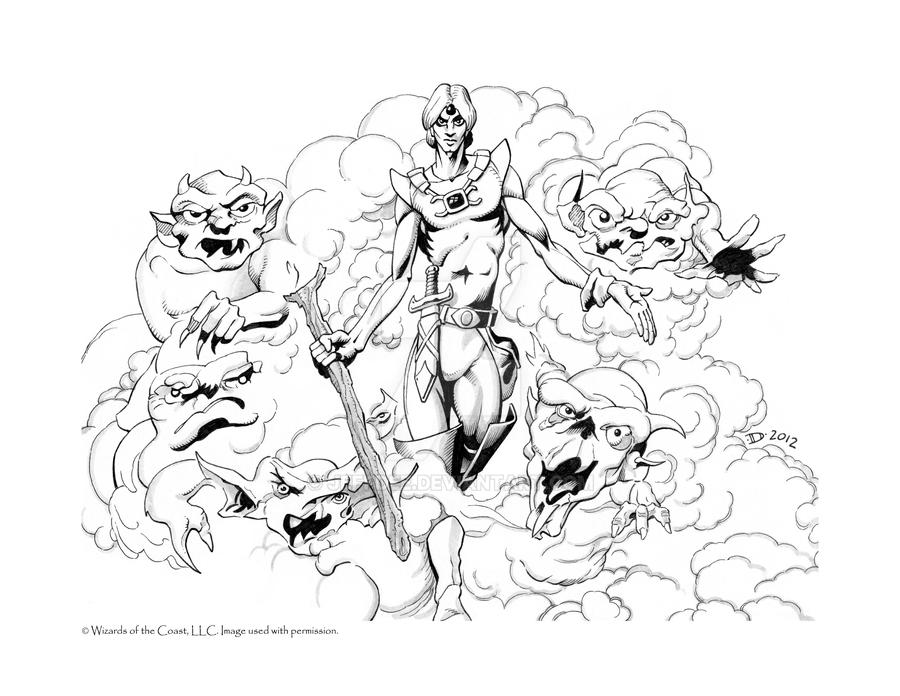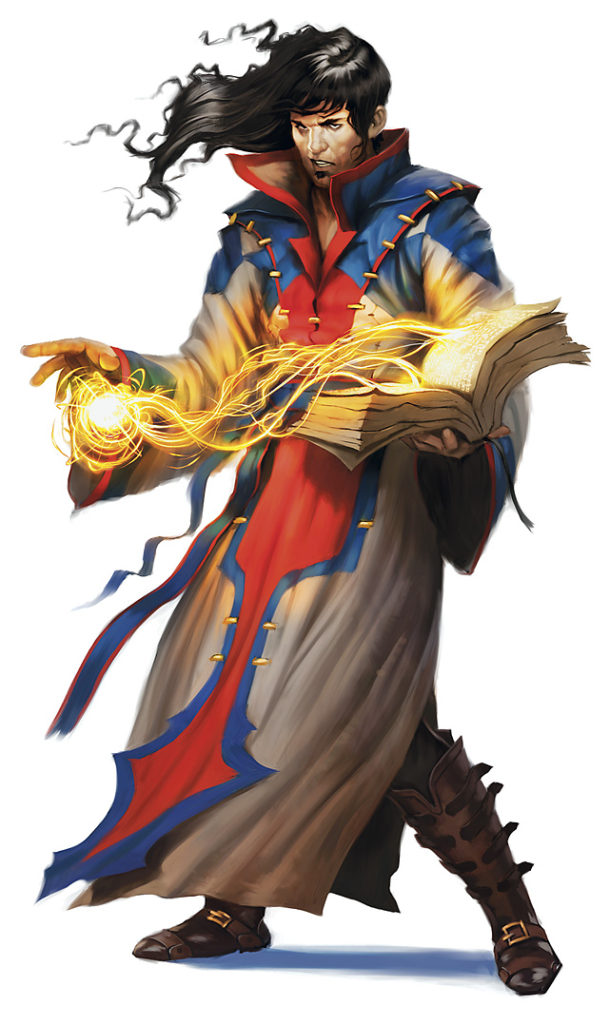
The Illusionist is a sub-class of the Magic-User, and it is the only such sub-class in the Player's Handbook (PHB) for Advanced Dungeons & Dragons 1st Edition (AD&D1e).
Like the Magic-User, the Illusionist is a spell-casting specialist. He has no ability to wear armor, and his weapon choices are just as limited. Because the Illusionist also carries a spellbook, he is often mistaken as a Magic-User. Sometimes the Illusionist bothers to correct this mistaken assumption, and other times he does not.
In acknowledging the utility of that ambiguity one also sees why and how what drives the Illusionist is not what drives the Magic-User. The Magic-User is obsessed with knowing the truth of the cosmos, for which the use of magic is the practical application. The Illusionist is obsessed with liminality--the space between two distinct states of being, both Is and Is Not simultaneously--for in that space the Illusionist sees power. "What is believed to be true is true, and therefore belief is power."
The Illusionist, therefore, is a man that knows the value of seeming and how it can overrule substance. The class's spell list reflects this, as does the fact that he does not start with read magic but instead three random 1st level spells and his ability to wield the cosmic power that Magic-Users pursue comes at the end of his career because that is the point where his command over the seeming (alter reality) becomes potent enough to dictate the substance of existence.
The Illusionist As A Character

The Illusionist is not merely smarter than the average bear, but has Dexterity on par with exceptional Thieves, and gets no bonus Experience Points for them.
The Illusionist's drive is to master the power of perception, which is what Illusionist spells are about. Everything about this class and its craft takes the conceits of a real world stage magician and plays its up, using the sword & sorcery fiction of past generations--upwards of a century ago now--which means that the Illusionist like the Thief and Assassin he prefers the city to the country and delves dungeons only for what he can get from it.
The progression of the Illusionist as a character mirrors his growing power over his magic. Weaponizing ambiguity and liminality via his magic he can fool people into seeing what isn't there, hearing what isn't there, and in time feeling what isn't there and even interacting with things that aren't what they seem to be- often in the form of a greebly coming at you.
Illusionists and their magic, therefore, is supernaturally-empowered gaslighting. Good ones use their power to protect and guide, hiding the weak from harm and making predators go where their prey is not, even crippling or killing targets that need to be struck down. Evil ones use that power to be criminals like Wormtongue or Jim Jones or similar figures wielding magically-modified perceptions to accrue influence deniably and transmute that into power without obvious vulnerability.
Their way of conflict is to shape the battlefield before swords are drawn, creating false perceptions that misdirect enemies and cloak allies. They use their magics to attack the enemy's morale by causing panic, incensing the hot-tempered when doing so would be disastrous and driving despair to the timid in turn, and they enjoy--from the start--tricking those opposed to them into doing as they will.
"Smarter than everyone else!" might as well be the Illusionist creed, and it is no surprise that they are given to Secret King Syndrome (and all that entails) due to whom is most likely drawn to practice such arts.
While the published spell list in the PHB is small, and published additions are few, what exists has plenty of utility for most purposes. It is only when the Illusionist survives the very real dangers involved with mastering his profession where he may feel the need to engage in spell research or item creation on a regular basis.
The Illusionist As Patron

As a Patron, the Illusionist is going to be most often seen as an advisor to someone else. As befits a master of deception and misdirection, the Illusionist will avoid being seen as the power in the Domain; he will put forth a false front, behind which he holds the substance--the real power--and thus it does not matter what becomes of the puppet so long as he remains.
More rarely is that he will assume a persona akin to that of the Magic-User, in that he will be known by a particular familiar name or title and have a known appearance, but also cultivate an aloofness to explain why The Boss isn't seen so often. This is the reverse of the above; he pretends to be the false front, and the alleged Grey Eminence behind him is the actual bluff.
This sort of arrangement, in whatever form, is an expression of a character that is now second-nature. Misdirection, lies of omission, willful ambiguity- all this and more are part-and-parcel of the Illusionist as Patron and how his Domain is administered. Even when the lights are very real, and what they illuminate is likewise as solid and ordinary, it will still be the case that an atmosphere of unreality permeates the region due to the passive effect that living in a perpetually liminal state has upon people, places, and things alike- all without any active magical force being employed. To outsiders it may seem as madness, and there may be truth it that- and that too is the very liminality of a master Illusionist making himself felt without doing anything at all.
It is no surprise, therefore, that even his allies never know where the Illusionist stands and his most reliable clients are those that neither ask too many questions nor pry too much into the nature of things in his Domain. "He may an illusion, but his gold is real" is often said of those he hires to do what his powers and personnel cannot.
Yet this mired-in-glamor mindset is also the undoing of many an Illusionist. Undone by overthinking his subtlty, only to find that a cold steel shiv in his ribs can't be so easily wished away or confronted with enemies against which his magics are as unreal as anything done by Penn & Teller, and too often with the end of the Illusionist so goes the illusions he weaved. Castles crumble into sand, roads dissipate like morning dew, bridges flicker out of sight as the trick of the light that they were- and the grand Domain in all its enchantment is gone.
The potential for Evil is obvious. For Good? The master Illusionist weaves gossamer tapestries of hope, making the world brighter than it is to inspire others to give substance to seeming. The phantasmal image of the great heroes of yesterday extolling the virtues in their deeds to inspire others to greatness. Great enemies' prisons are hidden away, for the general welfare, and the curious misdirected to harmless (more or less) forgeries where embarassment can prompt fools to reform and remove predators from the population.
But the Illusionist cannot abide certainty- his magic forbids it. He, like and unlike Thieves, Assassins, and Monks, can only thrive in the space between Is and Is Not. Do not be surprised, therefore, to find that the last illusion of a master Illusionist is that he ever was mortal at all. To exist forever between Is and Is Not--not undeath, but rather as a sentient concept, a living meme like Saint Germain--is a supreme trick.
So, I ask again, do you believe the Illusionist or your lying eyes?

No comments:
Post a Comment
Anonymous comments are banned. Pick a name, and "Unknown" (et. al.) doesn't count.